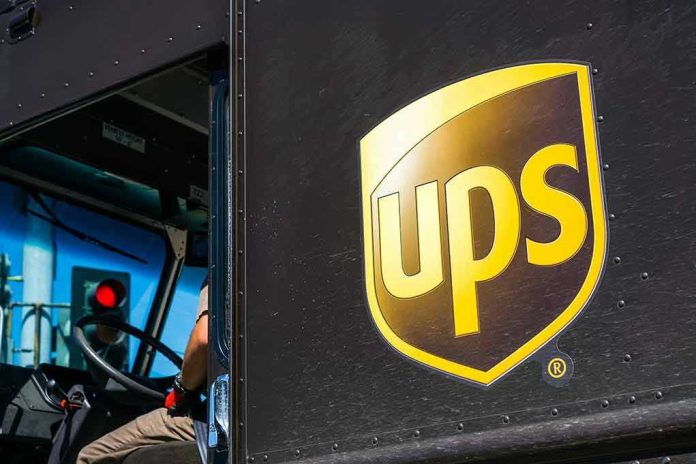
Imagine opening your front door to find a bill from UPS that’s not just higher than your purchase price, but so bafflingly incorrect that even customer service shrugs—then realizing you’re one of thousands trapped in a nationwide shipping fiasco fueled by new tariff rules.
Story Snapshot
- UPS customers across the U.S. face shockingly inaccurate tariff charges, sometimes exceeding the value of their shipped goods.
- Policy changes eliminated longstanding exemptions, triggering a flood of customs declarations and straining carrier systems.
- Customer service breakdowns leave packages in limbo or destroyed, with few clear answers from UPS.
- Small businesses and individual consumers alike report financial harm and consider abandoning cross-border e-commerce.
Systemic Chaos: The Breakdown in UPS Tariff Billing
UPS customers have reported a barrage of inexplicable and inflated tariff charges on international shipments since late summer 2025. Bills sometimes run hundreds or thousands of dollars above expectations, often with tariffs mistakenly applied from unrelated product categories—such as 200% Russian aluminum tariffs charged on items ranging from steel swords to auto parts. These stories aren’t outliers; they’re echoed by small business owners and individual consumers nationwide, each struggling to understand why their expected shipping costs have morphed into financial nightmares. Efforts to resolve these errors through UPS’s customer service channels routinely end in frustration, with callers facing long delays, incomplete explanations, and, in some cases, the abrupt return or outright destruction of their packages.
For many, the breakdown is more than an inconvenience—it’s a threat to their livelihood. Small and medium-sized businesses that depend on predictable cross-border shipping are finding their profit margins obliterated by surprise bills, while some consumers simply refuse delivery, unwilling to pay more in tariffs than their purchase was worth. The situation has left countless customers in a state of limbo, uncertain whether to trust UPS with future shipments, and unable to get their goods—or their money—back.
Policy Fuel: The Elimination of the De Minimis Exemption
The catalyst for this chaos is not unique to UPS, but the company’s handling of it has made it the poster child for shipping confusion. In August 2025, the U.S. government eliminated the longstanding de minimis exemption, which previously allowed goods valued under $800 to enter duty-free and without formal customs paperwork. This policy, once the backbone of global online shopping, especially from platforms like Shein and Temu, was erased in an effort to combat trade imbalances and tariff evasion. Suddenly, millions of additional packages required detailed customs declarations, each subject to potential tariffs and regulatory scrutiny. The result has been an unprecedented volume of paperwork flowing through logistics providers, overwhelming the very systems designed to ensure compliance and customer satisfaction. UPS, tasked with collecting the right tariffs and releasing packages from customs, found itself facing a deluge of errors and a customer service nightmare that shows little sign of abating.
UPS’s own leadership acknowledges the strain. Spokespeople describe a “rollercoaster ride” of regulatory shifts and capacity challenges, but offer little more than general reassurances and links to online resources. Customers and media outlets have documented the confusion, with some small business owners describing the brokerage system as “so slammed that they don’t know how to handle the volume, or they just have people not knowing what they’re doing.” The result is a perfect storm: new rules, old systems, and a glaring lack of operational resilience.
Collateral Damage: The Real-World Impact on Businesses and Consumers
The fallout from these tariff miscalculations is hitting hardest where American entrepreneurship is most vulnerable. Small businesses, already squeezed by thin margins, report lost sales and customer relationships unraveling as deliveries stall or vanish. Some have switched carriers—finding, in a few cases, that competitors like FedEx or DHL handle the new regulatory complexity with fewer errors. For others, the only option has been to suspend international shipments altogether, unable to risk the unpredictable costs and reputational damage. Consumers who once ordered from overseas with confidence now face a gauntlet of surprise bills, refused packages, and refund battles that threaten to chill cross-border commerce for good.
The broader economic ripples extend beyond immediate financial pain. As trust in international shipping erodes, e-commerce platforms and small exporters see their customer bases shrink. Carriers, meanwhile, grapple with reputational damage and operational backlogs that expose the risks of underinvesting in customs brokerage infrastructure. The government’s efforts to close loopholes and enforce trade fairness have, in practice, shifted the burden onto everyday Americans and small businesses, many of whom find themselves collateral damage in a regulatory crossfire.
Expert Views: Accountability, Adaptation, and the Road Ahead
Industry analysts and business owners agree on one thing: the current crisis is as much a failure of preparedness as it is a consequence of new rules. UPS frames the issue as an external compliance challenge, but critics argue that better planning and investment could have averted the worst of the fallout. As the backlog persists, some lawmakers and advocacy groups are calling for a reassessment of both the de minimis change and carriers’ responsibilities in tariff collection. If the situation remains unresolved, the market may see a permanent shift, with disillusioned customers migrating to competitors or abandoning international purchases entirely. The logistics sector’s experience in 2025 stands as a cautionary tale: regulatory change, no matter how well-intended, demands robust systems, transparent communication, and above all, respect for the real people whose livelihoods hang in the balance.
For now, the only certainty is uncertainty—and the hope that public scrutiny will force more than just apologies from those responsible for keeping global commerce moving.












